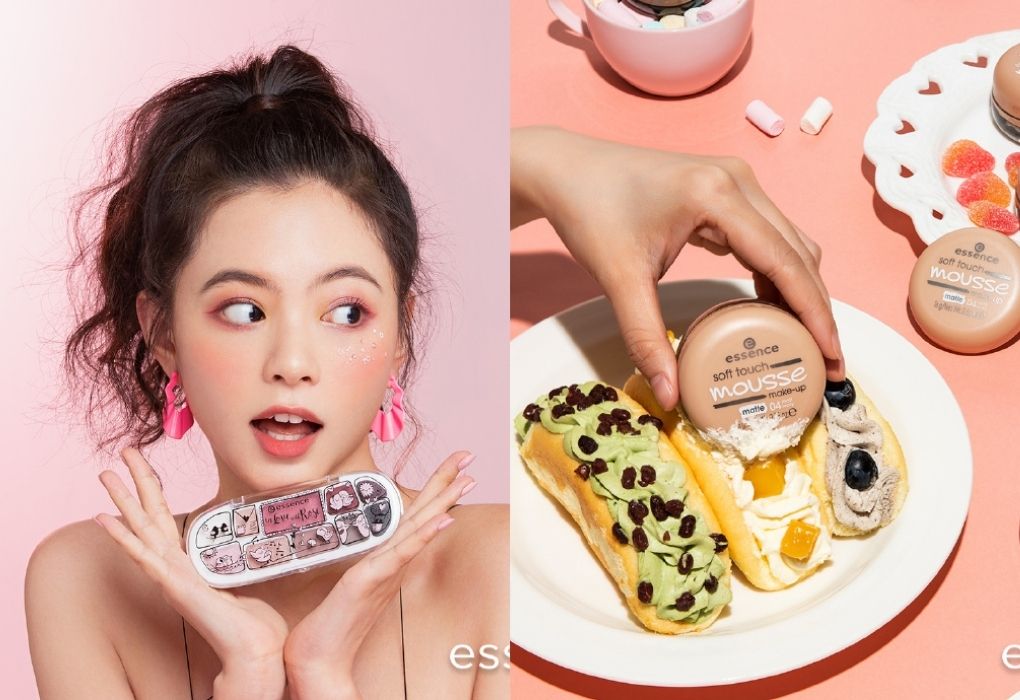In recent years, with the rapid rise of the Chinese beauty economy, many international beauty brands have rushed to layout and focus on the Chinese market. German companies are increasingly catching the attention of Chinese consumers seeking premium cosmetics and health products.
The growth rate of the global beauty market is amazing, and the Chinese market has an important position in the global beauty market. In fact, China has now become the world’s second-largest cosmetics market, and cosmetics have become daily necessities in Chinese people’s daily lives. Data show that the Chinese market, based on its huge population base, has a cosmetics volume of more than 358 billion yuan.
As the market evolves, Chinese consumers have become more rational, paying more attention to the actual effects of products and preferring more customized products. Moreover, the Chinese market is undergoing a digital transformation.
In this post, we are exploring the reason why german beauty brands are gaining ground in China and the way they can achieve higher sales year on year through the example of make-up brand Cosnova.
The performance of German beauty products in China
China’s economy has witnessed remarkable growth. Since Chinese people have more and more disposable money, they want to buy products of good quality and their consumption demand varies to enhance their lifestyles. There is a new trend for imported products as they are perceived as premium. German brands have been particularly appealing for high-quality and strict manufacturing standards, not only in European countries but also in China.
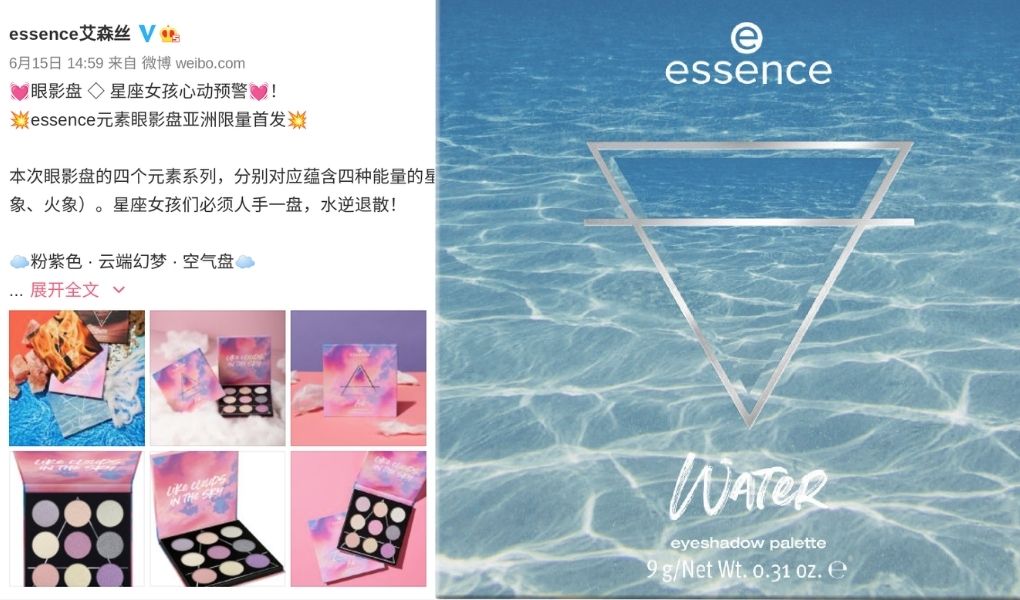
Chinese consumers’ rising enthusiasm for German cosmetic and wellness products has not been decreased by the epidemic. During the 6.18 Mid-Year Shopping Festival, German products were among the most popular items on Tmall Global, Alibaba’s cross-border e-commerce marketplace.
German Beauty Brands are Attractive to the young generation in China
With the rise of “generation Z” between 1995 and 2000, more rational young consumers prefer personalized, niche, and high-end quality products. In terms of innovation, imported products have played a unique leading role, filling the product gap in the Chinese cosmetics market to a certain extent.
For example, around 2012, South Korea took the lead in launching the BB cream that swept the Chinese market and even the global market, which rewritten the pattern of base makeup products; around 2016, the Spanish antioxidant ampules brand Martiderm triggered a new trend in skincare.
Having seen the success of other foreign brands in the Chinese market and after tests of the market, German cosmetics company Cosnova has made great efforts to enter the Chinese market. Notably during the Chinese shopping festival. For instance, in 2019 the brand increased its sale by 25% year on year.
Social e-commerce is booming in China & German Beauty Brands already got it
Social e-commerce in China is the use of social media platforms to conduct eCommerce transactions. This can include buying and selling products or services, as well as making payments and donations. China is one of the world’s leading markets for social eCommerce, with a large number of users using social media platforms to make purchases. This trend is only expected to continue, as more and more Chinese consumers shift towards online shopping.

Social media platforms have become very popular in China, with a large number of users accessing these platforms on a daily basis. This provides a great opportunity for businesses to reach out to potential customers and sell products or services. In addition, social media platforms can also be used to collect payments and donations from customers.
How do businesses take advantage of China’s social eCommerce market? let’s see an example
Before the real launch of its cosmetic products in the Chinese market, Cosnova, the mother company of Essence and Catrice, has already many reviews and recommendations on Weibo, Xiaohongshu, Zhihu, and other platforms, which means it has a good reputation and brand awareness in the Chinese market.
Social e-commerce is the new trend in China, social networks have opened online stores, live-streaming selling, or provided purchasing links in social media content. Based on the giant user base of social networks, this kind of e-commerce can reach quickly a lot of targets.
“Livestreaming is ideally suited to translate the haptic and sensory buying experience into the digital world,” said Cosnova Founder and President Christina Oster-Daum.
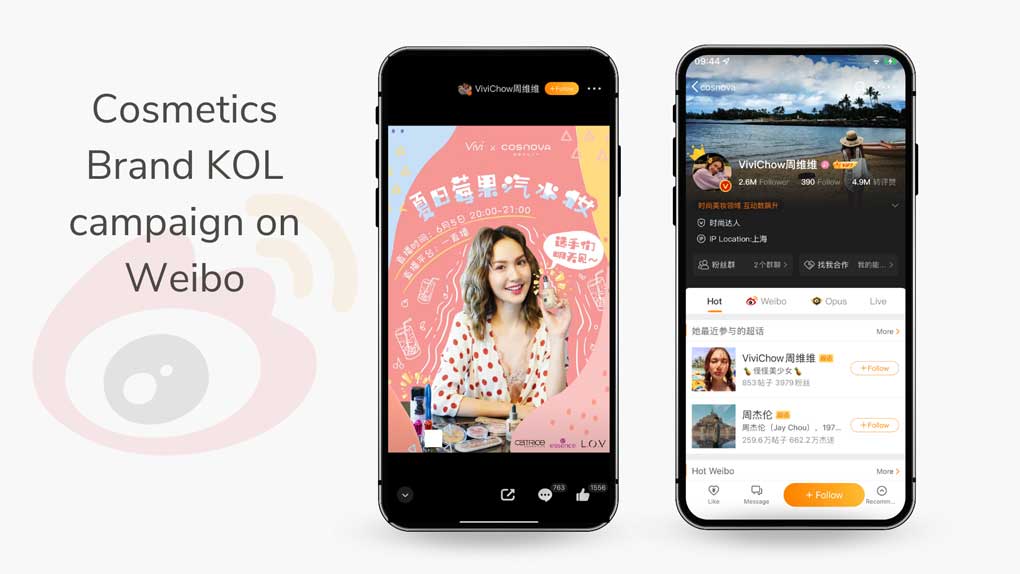
For instance, taking advantage of the popularity of the 618 e-commerce festival, the Cosnova group has teamed up with KOLs on Taobao live and Weibo Live to attract consumers and close the distance between the brand and the fans. Through live streams, viewers could see the KOLs they love and trust presenting Cosnova’s products and explaining why they are worth buying. As a result, the brand increases its sales and got new consumers: on that day, nearly 97% of the orders placed via the live stream were made by first-time customers.
Tmall Cross-border flagship stores are an opportunity for German Beauty Brands
Due to the restrictions of purchase channels, complicated physical store opening procedures, and the development of Chinese cross-border e-commerce guided by Chinese e-commerce leader Alibaba Group’s Tmall Global, many brands started to sell on the cross-border platforms.
One key benefit is that it allows businesses to sell their products to Chinese consumers without having a physical presence in the country. This makes it easier for brands to enter the Chinese market, as they don’t need to set up a distribution network or hire local staff.
Tmall Global was launched in 2014 as an extension of Alibaba’s Tmall marketplace, with nearly 26,000 brands from 84 countries and regions, of which more than 80% enter the Chinese market for the first time. It is a dedicated gateway for overseas brands to make their first entry into China and reach Chinese young consumers, who are seeking high-quality and special products from abroad.
Cosnova Group on Tmall Global
The Cosnova group, starting with Tmall’s overseas flagship store, gradually penetrated the Chinese cosmetics market. Upon arrival, the German cosmetic giant organized a series of activities based on the habits of Chinese consumers.
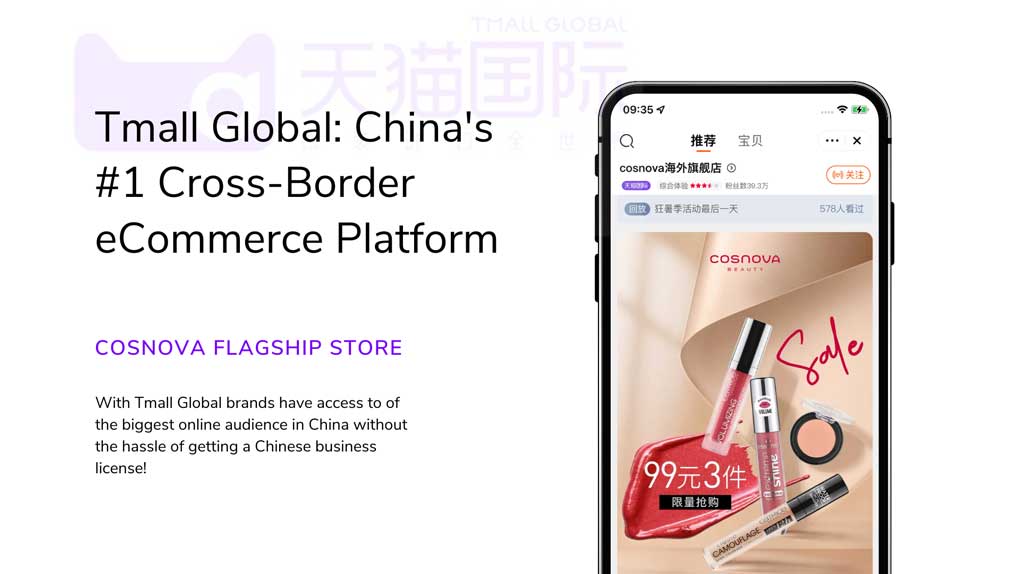
Selling on Chinese cross-border platforms can save businesses time and money to enter the Chinese market. Consumers who are willing and search for purchase imported products are gathering on those platforms.
The Chinese digital ecosystem is an opportunity for both Chinese and foreign (German) Beauty brands
Chinese social and e-commerce ecosystems are not only opportunities for China’s domestic brands but also offer a possible channel for foreign brands. By creating a strong social media presence, not only brands can reach out to Chinese consumers but build up a loyal following and work on their online reputation/ credibility.
There are a number of ways that (german) cosmetics brands can make use of social media marketing in China.
- One effective strategy is to partner with popular Chinese bloggers and influencers who have a large following on social media (like we have described a little earlier in this post. This can help to raise awareness of the brand among Chinese consumers and generate interest in its products.
- Another way to make use of social media marketing in China is to create engaging content that will appeal to Chinese consumers. This could include videos, beautiful pictures, gifs, blog posts and so on.
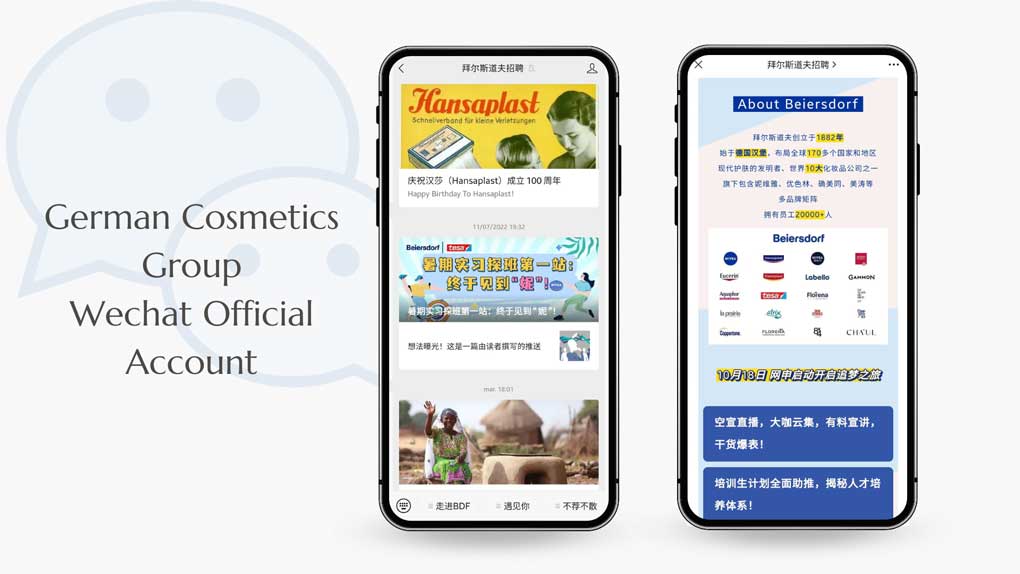
There are a few different Chinese social media platforms that beauty brands should do marketing on. Weibo is one of the most popular social media platforms in China and it is perfect for reaching a large audience. You can also use WeChat to target specific users based on their interests and demographics. Weibo helps with awareness, wechat helps with loyalty.
Additionally, there are social media platforms that cater to beauty and lifestyle lovers, such as the Little Red Book but Douyin would also be a good bet to communicate with a different target audience for instance. On the little red book, the focus on your official account should be on creating visually appealing content, encouraging the app users to post product reviews. With both douyin and the little book, the short video and live streaming are interesting to improve engagement and sales. Both these apps have integrated e-commerce, you could think of them as additional sales channels once your brand is already well settled in the country.
Need a little help to grow your German Beauty Brand on the Chinese market?

Since 2012, GMA has been engaged in foreign businesses’ entry into the Chinese market. As an expert in the Chinese market and Chinese digital marketing, we are an efficient and professional partner for your strategies to gain more influence on the market.

